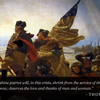Fćrsluflokkur: Stjórnmál og samfélag
15.6.2010 | 12:46
Cities and School Districts Being Fleeced By Wall Street
June 15, 2010 (LPAC)—A growing number of municipalities and school districts around the United States are being taken to the cleaners by Wall Street sharks, through the manipulation of interest rates swaps, that have been peddled to local governments by such Wall Street pirates as JP Morgan, the former Bear Stearns (now part of JP Morgan Chase) and the Royal Bank of Canada. This looting scheme, in which cities and school districts take out interest rate swap contracts on their debt instruments, as a hedge against future interest rate hikes, has already led to a number of defaults, lawsuits, and a move by the Pennsylvania State Senate to ban the practice altogether.
In Oakland, California, the city is paying out between $10-15 million a year to Wall Street firms, that sold them interest rate swap contracts, that came due when interest rates did not increase. Most of these contracts involve steep default penalties that trigger any time there is a failure to meet a payment. In Pennsylvania, the Bethlehem School District lost $10 million on a swap-deal-gone-sour, and the State Senate Finance Committee is now considering a legislative ban against any swap contracts by municipalities and school districts. The Pennsylvania Auditor General Jack Wagner assailed these swap swindles, which are "lining the pockets of Wall Street." We are assembling a national picture on this scandal.
Under the Blanche Lincoln derivatives ban, written into the Dodd financial reform bill as Title 7, swap dealers "shall have a fiduciary duty to the State, State agency, city, county, municipality, or other political subdivision of a State, or the Federal agency, as appropriate." In other words, the banks peddling interest rate swap contracts would have an obligation to fully inform the purchasing agencies about the risks and potential losses on these instruments, before the sales.
Even more appropriate would be an all-out ban, as proposed by the Pennsylvania State Treasurer, and implicit in the adoption of the Glass-Steagall principle back into national banking law.
15.6.2010 | 12:34
Obama Carries Towels for the Queen
June 15, 2010 (LPAC)—In his fourth trip to the Gulf of Mexico, Obama acted like a claim-adjustor's clerk for the Queen of England, telling Mississippians, "We're gathering up facts, stories, right now so that we have an absolutely clear understanding about how we can best present to BP the need to make sure that individuals and businesses are dealt with in a fair manner and a prompt manner."
In three Gulf-state video-ops with locals and Coast Guard officials, Obama also devoted a lot of words to the bright idea of inventorying vessels which might be available for the cleanup, and determining, for example, which had radios and which had the potential to lay boom. This on Day 56 of the disaster!
Like Dubya Bush, who told Americans that they could fight the effects of 9/11 by going on shopping sprees, Obama told them that the best way to fight the effects of the spill was not to cancel their planned vacation trips to the Gulf,—that is, provided that the beaches they intended to visit had not already been polluted.
14.6.2010 | 14:35
Lindsey Williams Talks with Alex Jones About Deadly Gases Leaking from BP Spill 1/9
Alex welcomes back to the show Lindsey Williams, author of The Energy Non-Crisis, who talks about Big Oil and the Gulf spill. Bilderberg hound and journalist for the American Free Press, Jim Tucker, gives a Bilderberg round-up following the latest elite confab in Spain. Alex also covers the news and takes your calls.
13.6.2010 | 23:27
Henry Siegman on Israel's Greatest Loss: Its Moral Imagination
June 13, 2010 (LPAC)—Henry Siegman, one of the elder statesmen of American Jewry, who served as national director of the American Jewish Congress from 1978-1994, and now runs the U.S./Middle East Project, penned a devastating expose of Israel's moral degeneration in the Friday, June 11 edition of Israel's Ha'aretz newspaper. Writing under the headline, "Israel's Greatest Loss: Its Moral Imagination," Siegman, who was born in Frankfurt in 1930, later coming to the United States from Antwerp, and serving as an Army chaplain in the Korean War, recounted a conversation with a close friend in Israel, days after the Israeli commando assault on the Gaza aid flotilla. The friend lamented that the international condemnation of Israel "was reminiscent of the dark period of the Hitler era."
Siegman wrote, "When I managed to get over the shock of that exchange, it struck me that the invocation of the Hitler era was actually a frighteningly apt and searing analogy, although not the one my friend intended. A million and a half civilians have been forced to live in an open-air prison in inhuman conditions for over three years now, but unlike the Hitler years, they are not Jews, but Palestinians. Their jailers, incredibly, are survivors of the Holocaust, or their descendants. Of course, the inmates of Gaza are not destined for gas chambers, as the Jews were, but they have been reduced to a debased and hopeless existence... Particularly appalling is that this policy has been the source of amusement for some Israeli leaders, who according to Israel press reports have jokingly described it as 'putting Palestinians on a diet.' That, too, is reminiscent of the Hitler years, when Jewish suffering amused the Nazis."
Siegman clarified, "Of course, even the most objectionable Israeli policies do not begin to compare with Hitler's Germany. But the essential moral issues are the same... So, yes, there is reason for Israelis, and for Jews generally, to think long and hard about the dark Hitler era at this particular time. For the significance of the Gaza Flotilla incident lies not in the questions raised about violations of international law on the high seas, or even about 'who assaulted who' first on the Turkish ship, the Mavi Marmara, but in the larger questions raised about our common human condition by Israel's occupation policies and its devastation of Gaza's civilian population. If a people who so recently experienced on its own flesh, such unspeakable inhumanities cannot muster the moral imagination to understand the injustice and suffering its territorial ambitions—and even its legitimate security concerns—are inflicting on another people, what hope is there for the rest of us?"
13.6.2010 | 17:34
Fáum Hamid Karzai til Íslands.
"Hamid Karzai, forseti Afganistan, heimsótti í dag helgistađ talibana í Kandahar og lofađi um leiđ ađ bćta stjórnun í landinu, en spilling er mikiđ vandamál í Afganistan."
Er mögulegt ađ fá hann til Íslands í sömu erindagjörđum, og tala viđ Talibanana, hér á íslandi.
Hér er jú ţó nokkur spilling, ađ ţví er sagt er.

|
Karzai talar viđ talibana |
| Tilkynna um óviđeigandi tengingu viđ frétt | |
13.6.2010 | 15:29
Online Stock Market Index Re-Introduces Deutschmarks
June 13, 2010 (LPAC)— Boersennews.de, an online stock market index, based in Leipzig, has begun listing stocks also in terms of their value in deutschmarks. The index managers are saying they do not want to abandon the euro, but will "pay tribute to the rising sentiment in the population for the mark." The index has 300,000 clients, on a daily average.
Of interest in this context is also a report in Stuttgarter Zeitung, on perspectives of gold as a safe haven for investors: The article warns that rushing into gold could "prove to be a risky investment," because "should the euro crisis deepen and cause a return of the d-mark, it will affect the market value of gold. For, the new old currency would gain against the dollar. Thus, every investment denominated in dollars would abruptly lose in value.
13.6.2010 | 15:28
Some Insiders Share LaRouche's View: Crash Is Imminent
June 13, 2010 (LPAC)—It's becoming increasingly clear that a number of finance world insiders are bracing for a near-term disaster of monumental proportions, and are, thus, increasingly moving in the direction of Lyndon LaRouche's forecast of a June-July blowout, unless a Glass-Steagall reorganization of the banks is implemented now. Among the voices for a breakup of the too-big-to-fail financial institutions are at least two regional Federal Reserve Bank presidents, a former International Monetary Fund chief economist, and New York University Stern School of Business Prof. Nuriel Roubini. One senior U.S. intelligence source confirmed in discussions with EIR this week that "there are significant numbers of people at the Fed, and even at the Treasury Department, who support a return to Glass-Steagall." He added that, if the ongoing House-Senate conference fails to produce a financial reform bill with real teeth, "the backlash could be overwhelming, and could be the driver for Glass-Steagall being implemented." He added that the Obama Administration, along with the top leadership of both the Democratic and Republican parties are oblivious to the "French Revolution alert—what LaRouche refers to as the mass strike."
It would appear that some of the recent attacks on TBTF ("too big to fail") are driven by the expectation that Wall Street and London will prevail on the House-Senate conference, and kill the Blanche Lincoln derivatives segment, and block any serious inclusion of Glass-Steagall. On a deeper level, some of these economists are bracing for another major financial blowout, very soon. This was the explicit message in two articles by former IMF chief economist Simon Johnson, circulated by Roubini Global Economics. On June 7, Johnson gave an extensive account of a June 3 speech by Richard Fisher, the President of the Dallas Fed, at the SW Graduate School of Banking, in which he declared that the TBTFs had to be broken up, and that no amount of regulation would work.
Fisher told the audience, "Regulators have, for the most part, tiptoed around these larger institutions [big banks]. Despite the damage they did, failing big banks were allowed to lumber on, with government support. It should come as no surprise that the industry is unfortunately evolving toward larger and larger bank size with financial resources concentrated in fewer and fewer hands... As a result of public policy, big banks have become indestructible. Big banks that took on high risks and generated unsustainable losses received a public benefit: TBTF ['too big to fail'] support. As a result, more conservative banks were denied the market share that would have been theirs if mismanaged big banks had been allowed to go out of business. In essence, conservative banks faced publicly backed competition."
Fisher added, "The system has become slanted not only toward bigness but also high risk," further warning, "We know from intuition and experience that any financial institution deemed TBTF will not be allowed to fail in the traditional sense. When such an institution becomes troubled, its creditors are protected in the name of market stability. The TBTF problem is exacerbated if the central bank and regulators view wiping out big bank shareholders as too disruptive, extending this measure of protection to ordinary equity holders." Fisher's ultimate conclusion: The TBTFs must be busted up.
Making good on his word, Fisher, on June 10, wrote to Sen. Blanche Lincoln (D-Ark.), endorsing her provision in the financial reform bill, prohibiting banks from engaging in proprietary trading in derivatives, and other similar activities. The Fisher letter was practically identical to the letter, sent the same day to Senator Lincoln, by Kansas City Fed President Thomas Hoenig.
In a second June 10th document, also circulated by Roubini, Simon Johnson warned that Wall Street was out to kill the Lincoln derivatives regulation, and that President Obama and the White House team, led by Larry Summers, are totally in lockstep with the mega-banks. "We will learn a great deal in the coming weeks, not just about the future stability of our financial system, but also for what President Obama really stands."
Nouriel Roubini, in a May 18 interview with TruthOut, was even more direct: "My view is that if banks are too big to fail, using higher capital charges and an insolvency regime is not going to work. If they're too big to fail, they're just too big, and they should be broken up.
"If they're too big to fail, they're also becoming too big to be saved, too big to be bailed out, and too big to be managed. No CEO can monitor the activities of thousands of separate profit and loss statements, and the activities of thousands of different bankers and traders. So that's one dimension. We must be capable of going beyond the Volcker Rule, which is essentially Glass-Steagall-Lite. We need to go all the way and implement the kind of restrictions between commercial banking and investment banking that existed under Glass-Steagall."
Asked why he was critical of the Volcker Rule, Roubini explained, "The Volcker Rule goes in the right direction, but in my view, the model of the financial supermarket where within one institution you have commercial banking, investment banking, underwriting of securities, market-making and dealing, proprietary trading, hedge fund activity, private equity activity, asset management, insurance—this model has been a disaster. The institution becomes too big to fail and too big to manage.
"It also creates massive conflicts of interest. If you look at the cases against Goldman Sachs and Morgan Stanley, leaving aside whether there was any fraud or illegal activity—that's for a court to decide—there is still a fundamental conflict of interest. These institutions are always on every side of every deal. That's an inherent conflict of interest that cannot be addressed with Chinese walls [internal company barriers between different aspects of its business]."
13.6.2010 | 10:54
BP Lied: Neither BP nor Obama Administration Deployed Assets To Stop Spread of Oil Spill
June 12, 2010 (LPAC)—British Petroleum claimed that it could handle an oil spill of 12.6 million gallons (or 300,000 barrels) a day, in its "Oil Spill Response Plan" filed as a requirement for being allowed to operate its Deepwater Horizon well. But because neither BP nor the Federal government was prepared to deploy the necessary assets to clean up the spill, BP has only been able to recover about 1.5 million gallons over the past six weeks, according to Ben Raines of Alabama's Mobile Press-Register, who was interviewed on National Public Radio's "To the Point" program.
Raines was joined by Prof. Edward Overton of Louisiana State University, who agreed with Raines, and insisted that there should have been a "war" on spilled surface oil from the beginning, but that very little has been done. If this had been done from the beginning, Overton said, you wouldn't have to disperse it below the surface, and could stop it before it reaches the shore line. "We've got the technology to do this," he said; it's just not in the Gulf. He pointed out that every major port in the world has large skimmers, which should have been put on C-117s and flown in to the Gulf. They should have put up floating hotels for workers operating skimmers so they can spend most of the day working instead of in transit back and forth. Overton also said we need aerial assets to find where the thick oil patches are, so they can be skimmed up.
Overton said it's best to use booms to collect the oil, and then skim and suck the oil up out of the booms. Raines said the BP Response Plan listed hundred and hundreds of skimmers in the Gulf, and claimed they could recover 17.6 million gallons per day by skimming, but they arrived at this figure by just adding up all the skimmers in the Gulf; but of course they are not all being deployed, and many are small and can't work offshore in big waves.
Raines said burning is far and away the quickest way to get rid of the oil; in one day, they burned 700,000 gallons. But BP doesn't have the fireboom technology; they had to buy the first one in Illinois, and get more from Alaska, from which they ordered 8,000 feet, then cancelled the order, then re-ordered 10 days later. The Coast Guard has a 1994 plan, which gives pre-approval for burning off oil spills; this could have been implemented immediately, but for the lack of the firebooms and other needed assets. There are now eight fireboom boats, but there should have been 40 boats out there with the booms, soon after the explosion when the spill started.
Crisis in the Gulf of Mexico Part III
NOTE: Check at 6.40 Min !!!
Coast Guard to BP: Speed It Up, Stop the Spill
Stjórnmál og samfélag | Breytt s.d. kl. 11:25 | Slóđ | Facebook | Athugasemdir (0)
12.6.2010 | 22:10
Video: What happens when coffee gets spilled at BP headquarters?
Recent estimates put the spill in the Gulf of Mexico as growing by anywhere from 20,000 to 40,000 barrels of oil per day – making the slick four times as large as the Exxon Valdez incident. After multiple failed attempts to stem the flow, the public is beginning to get the idea that BP has no idea how to contain this disaster. With widespread ecological destruction already in full swing and growing by the second, it's hard not to wonder just how bad this is going to get before a workable solution comes to light. In the mean time, the residents of the gulf coast continue to watch as one slip up from a global corporation threatens to end their current livelihoods.
As dark as the situation is, we could all use a little laughter, and the Upright Citizens Brigade have taken it upon itself to give the petroleum giant the ribbing it deserves with a new video. The quick flick asks the question: How would BP handle a conference room coffee spill? Hilarity ensues. Hit the jump to see for yourself, but be aware that there is some explicit language.
June 12, 2010 (LPAC)—Currently circulating on Russian-language Internet sites is a 12-minute clip from a recent Russia.ru broadcast by Prof. Igor Panarin of the Diplomatic Academy of the Russian Ministry of Foreign Affairs, titled "London Shall Not Seize Moscow!" While the current state of Russian economic policy, including the legal registration of a large number of Russian corporations in British and related offshore havens, might suggest that the seizure had already taken place, Panarin's summary of 500 years of British enmity for Russia is a carefully worded appeal for Russian leaders to "draw the lessons" of that history, and not be fooled again.
The interview also comes amid the considerable resonance of recent writings of Lyndon LaRouche and his EIR Online, issued in Russian, including "Free Russia from the Pirates of the Caribbean! - The Case of Arkadi P. Dvorkovich," the EIR article "London's 'Our Men' Keep Poisoning Russian Policy," and LaRouche's memorandum on British monetarist imperialism, sent to the June 9-10 Moscow conference on Afghan Drug Production. These publications are reportedly being hotly discussed in Russian political circles.
Panarin reviewed Anglo-Russian tension from the time of English operations against Ivan Grozny (Ivan the Awesome, or the Terrible) in the 16th Century, and especially after the late 18th Century, "when the Seven Years War had made Britain the world-ruling British Empire." He cited the famously reported reason for the British organizing the murder of Tsar Paul I in 1801, namely that Paul might really have been sending a Cossack force through Afghanistan into India.
World War I was identified by Panarin as the outcome of the British Round Table's scheme to dominate the world by destroying Germany and Russia. World War II, he said, began when the British 1938 Munich agreement with the Nazis "sent Hitler east," but Panarin also cited Bank of England credits to the Nazis in 1934-1940. On the Russian side, Panarin laid out the rarely mentioned fact that the British backed both sides in the 1918-1921 Russian Civil War, in which 10 million died: White Army General Kolchak was "recruited by Churchill," while Bolshevik figure Leon Trotsky created the Red Army, with Robert Bruce Lockhart and Sidney Reilly of British Intelligence as his advisers. It was only the victory of "Bolshevik statists" under Stalin against "Bolshevik globalists," which prevented the utter destruction of Russia in that period, he said.
Although Panarin incorrectly stated that the British Empire ceased to exist at the close of World War II, his most important remark conveyed that it really did not. Said Panarin, "London is the historical enemy of Russia, and London is also the contemporary one, because it is precisely in London that all the enemies of the current leadership of the Russian Federation have gathered. And, it seems to me that Russia needs to draw the lessons of this centuries-long geopolitical opposition. Take this example: during World War I, Russia provided its allies in the Entente with a million rifles and 5 million rounds of ammunition for combat at the front, but received nothing in return. And that was done deliberately, to achieve destabilization, such that 1915 was a year of stunning defeats for the Russian Army. And when Russia began to recoup ... and threatened British interests, British Intelligence agents carried out a successful operation to overthrow the Russian emperor; it is my view that the February Revolution [1917] was the fruit of British Intelligence operations."
Panarin maintains a high public profile as host of the Voice of Russia interview show World Politics. He is most famous for his forecast that the U.S.A. will plunge into crisis and fragment in the summer of 2010, but few in the West have reported that Panarin says the threats to the existence of the U.S.A. originate from London-centered financial interests, including "aristocrats who have held on to their fortunes for many centuries," who intend to survive and retain power by destroying the United States.
Um bloggiđ
Amazing Iceland and Icesave
Nýjustu fćrslur
- Washington Represents the Most Concentrated form of Evil in H...
- F William Engdahl - Totalitarian Democracy in the New World O...
- Í tilefni játningar Tony Bliar
- Washington's Path to War with Russia
- Obama Places World on Fast Track to Thermonuclear War
- State of the Union - Lyndon LaRouche - Jan 18, 2012
- Thanks for arriving early!
- Banned incredible Ron Paul Video
Fćrsluflokkar
Tenglar
Pólitík
Stjórnmál og kosningar 2007
- HJARI VERALDAR
- Inspired by Amazing Iceland Amazing Videos from Iceland
- FREE Iceland Crash Book Iceland Crash Enslaving a Small Nation. The Brutish Empire strikes again.
- ICALAND ECONOMIC DISASTER
- GLOBAL GLASS STEAGALL Saving the Planet Now!: A Global Glass Steagall
- Iceland Crash ! Vefsíđa á ensku um hruniđ á íslandi
- Kvótagreifarnir Kvótabófarnir sem öllu ráđa!
- Wordpress Stjórnmál My Wordpress Blog. Iceland Crash
- Freedom Burma. Restoration AUNG SAN SUU KYI er eini Nóblesverđlaunahafi í fangelsi !
Góđir Linkar
Áhugaverđir Linkar fyrir ferđamenn,og ađra sportmenn.
- Silencer Brake Combo Gun silencer and gun Tech Books and accessories for rifles and pistols
- Heimasíða Rifflar BRS Custom Rifles Custom rifles precision made. Hunting and target rifles.
- Glass Bedding Rifles Leiđbeiningar um hvernig á ađ bedda riffle
- Custom Rifles Blog Custom Rifles, Gun silencer blog
- Double Action Brake Silencer og Muzzle Brake Combo.
- Síðan Mín ! How to make a gun silencer
- Gun Silencer How to make a gun silencer
- Amazing Iceland Video Collection
- GOOGLE PRECISIONGROUP
- MSN Precisiongroup
- YAHOO PRECISONGROUP
- Amazing Iceland !
- B.R.S. RIFLES BLOG
- TOOL DESIGN !
- RIFLEPRO BLOG !
- MSN RIFLEPRO SPACES
- Betri Rifflar !
- NÁTTÚRU VIDEO GOOGLE
- TOOLPATENT !
- VIDEO VERSLUN.
Bloggvinir
Heimsóknir
Flettingar
- Í dag (19.9.): 0
- Sl. sólarhring: 2
- Sl. viku: 8
- Frá upphafi: 0
Annađ
- Innlit í dag: 0
- Innlit sl. viku: 8
- Gestir í dag: 0
- IP-tölur í dag: 0
Uppfćrt á 3 mín. fresti.
Skýringar


 gammon
gammon
 bofs
bofs
 lovelikeblood
lovelikeblood









